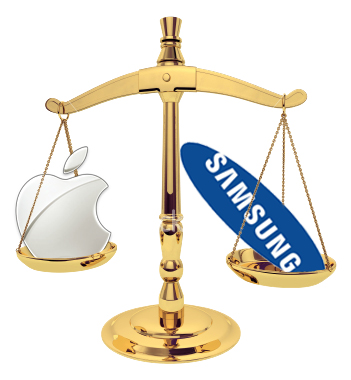A South Korean court has delivered a split decision in its piece of the patent infringement battle between Apple and Samsung. According to a report by the Wall Street Journal, the three-judge panel declared Apple infringed two Samsung technology patents, while Samsung violated one of Apple's. Each was awarded a small fine and face a sales ban in the country affecting some older products.
In particular, Samsung was found guilty of infringing Apple's screen "bounce back" design patent, but not its slide-to-unlock, home screen icons and other software related patents. Conversely, Apple was found to infringe two Samsung wireless patents. The latter were previously identified as standard-essential patents, however, which is why patent expert Florian Mueller from Foss Patents believes the ruling is "highly problematic and will have diplomatic repercussions."
According to Mueller, South Korea has essentially decided to become a rogue state in connection with standard-essential patents, suggesting that foreign companies must bow to extortion by locals Samsung and LG in order to sell their technology products to the country's 50-million population. He also suggests it was a biased ruling noting that in countries where neither company is headquartered, including France, Italy, the Netherlands, and three times in Germany, Samsung has won zero injunctions so far.
Apple was ordered to pay the equivalent of $35,000 in damages while Samsung was told to pay $22,000. The court also ordered an immediate block on sales in South Korea of Apple's iPhone 3G, iPhone 4, iPad and iPad 2, and 12 models of Samsung's Galaxy smartphones and tablets.
Sales of the iPhone 4S and the Galaxy S3 smartphones were not affected as those devices weren't out in the market at the time the lawsuits were filed. That said, with this decision as precedent Samsung could easily seek injunctions against the iPhone 4S, new iPad and future devices over standard-essential patents, forcing Apple to either pay up, agree to a cross-licensing deal, or leave the country.
Apple and Samsung can appeal the decision, which would involve a rehearing of the entire case.The companies are also awaiting a decision in a parallel case in the US, which could arrive anytime now.
